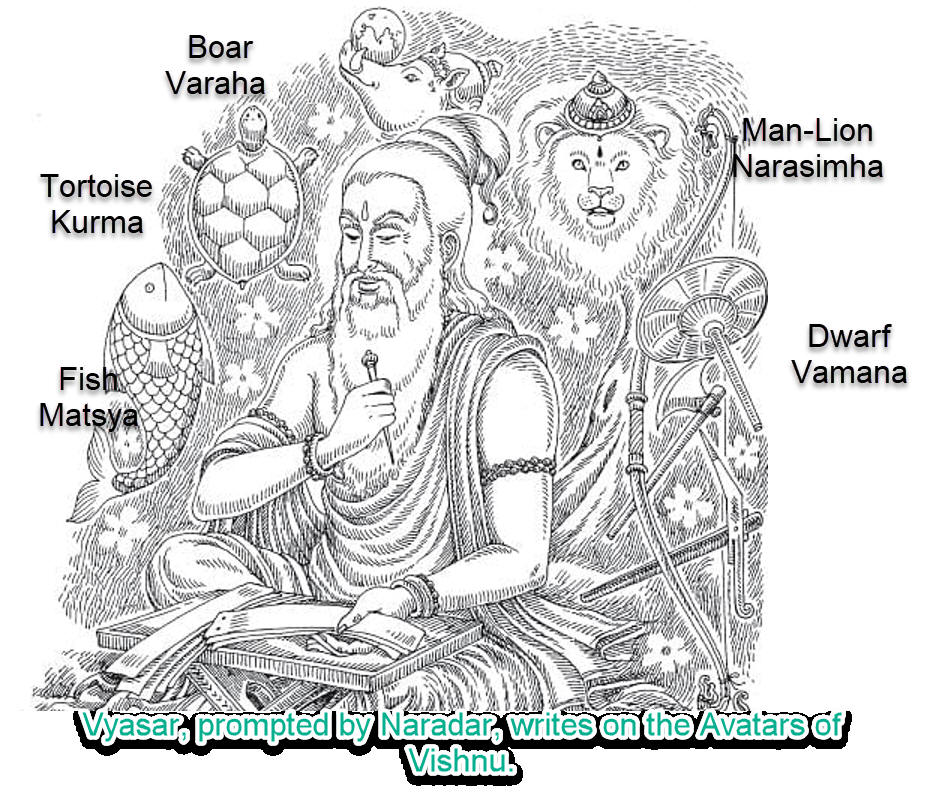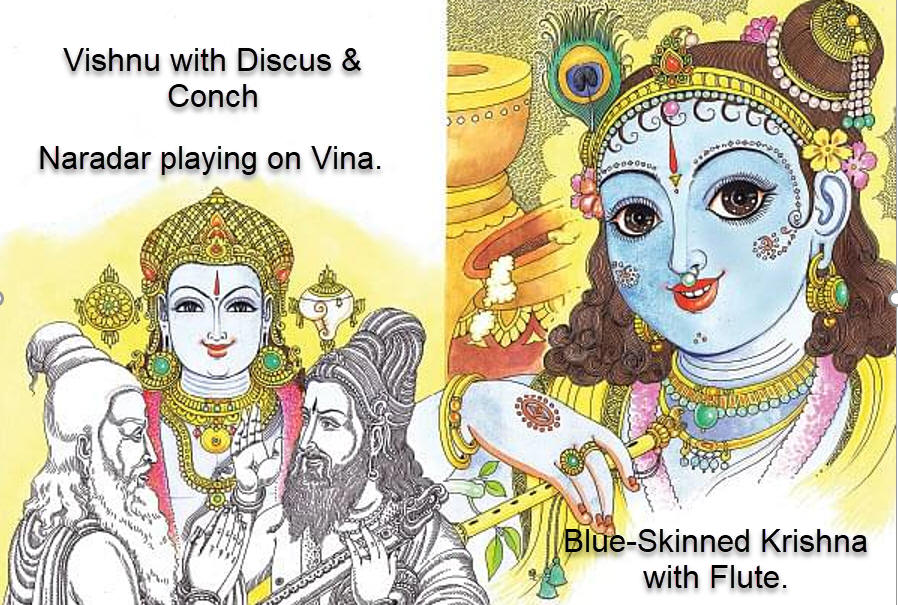Published: 09 Dec 2013 7 PM Updated: 09 Dec 2013 7 PM Sakthi Vikatan
Author: Wordsmith Balakumaran
Vikatan Correspondent
Naradar Lifted Vyasar From Doldrums and Inspired Him To Write Bhagavatam
2. Naradar is a man of high sensitivity to the personalites of others. He registers the sorrow of others wherever they are. Naradar was the son of Brahma, the creator, and possessed unique qualities. Having the charitable mind of wishing that good people should never suffer sorrow, these vibrations become possible for him. When someone has a genuine concern for others, the ability to remove such miseries comes into the concerned person's possession. Love and attentive care are inextricable.
3. Naradar realized, as he approached the earth, the soul in suffering was Vyasa Maharishi. Vyasar in mental agitation: How could that be possible? Naradar decided to explore Vyasar's worry, its cause, and cure. Naradar came close to Vyasar in his hermitage, bowed to him, and sang the Govinda Namavali.
4. Vyasar greeted with opposed palms, welcomed him, keenly listened to his song, and again paid homage to him.
5. Vyasar: "What voice! What a wonderful voice!"
Naradar in a tone of obeisance and concern: "It appeared as if you had a streak of sorrow. That is why I came seeking a reason for it and offer any help I can. Forgive me if I am wrong and officious."
Vyasar: "True. You know the past, the present and, the future. You discovered this ordinary Muni's uneasiness."
I was composing the Vedas. I caught hold of the beginningless words and phrases and put them in four categories.
6. Vyasar: I wrote high of Krishna, the central figure in the war, and it appeared as good writing with no need for corrections when I read it back. All came together nicely in telling the story of Mahabharatam. I felt something was amiss and missing in my writing. Only upon writing the missing piece I will have satisfaction. What was that which I have not done? Whose history I need to put on the palm leaf. Should I go around the world? Whom else did I forget? Should I write the world history? "

8. Vyasar: "I feel a deficiency but cannot identify it. It is my good fortune you came to discover the defect and help me. Your visit is evidence of my good merits, blessings from my forefathers, and an injunction from God to you to visit with me."
9. Naradar laughed loudly and looked at Vyasar with love and concern, and said, "Vyasa Maharishi! My arrival here must be an injunction from God. When I was passing by, why should your mind’s agitation come to my notice? Why did I worry about it and come down here? The omnipotent God puppeteers us. We do things as he moves us. Let us think about your disquiet?
10. Naradar: "Should you not write about Tirumal who prompts all, activates you, and causes movements of the earth, the change in the seasons, the growth, and maintenance and death to all that exist? Should you not write about his history? He is the primary cause of everything. He is the causal agent of all movements on earth. Brahma is the creator; Siva is the destroyer. Should there be not a sustainer of the earth and life forms on the earth? He is the causal agent for changes. You must narrate his story."
11. "Tirumal took birth on this earth as Avatars and described the cause and purpose of them. He proved who he is. The earth waits with anxiety when he will take another Avatar to bring back tranquility. You must compose his Lilas on earth and call it Bhagavatam. You must tell the people the chronological order of Tirumal's incarnations, and this Bhagavatam will remain as long as the sun and the moon exist. Bhagavatam is not merely a story but a history of Dharma and Avatars' descent for the protection of Sadhus and the establishment of Dharma. Bhagavatam is a narrative of his Lilas that tell the consequences of Dharma and Adharma.

13. Vyasar: "Thanks! You showed me the right path and told me about the most important task ahead of me. The most worthwhile events to record for posterity are Tirumal's rescue of this world from a multitude of evil forces, the promotion and prosecution of virtuous deeds, his leadership and initiative. A matter of great importance is praising the person(s) who helps the earth prosper. I will undertake this task of writing the Bhagavatam."
14. Naradar took leave of Vyasar, who took a ritual dip in the Sarasvati river and applied his one-pointed mind to write Bhagavatam.
15. The seasons change; the scenery changes; kings come and go; one religion wanes and other waxes, but Dharma remains steady, a matter of constancy and permanence. Bhagavatam should remain a story of disparate times: the rise and fall of powerful men and their strengths, faults and foibles. The ordinary men should not suffer from the oppressive and powerful men. Earth's peace is essential. The Avataras took place to keep that peace in place. Vyasar applied his unifocal mind to tell the Tirumal's story.
16. Narada Maharishi is the primary root of the Bhagavatam we read and enjoy today. Though the writer was Vyasar with a faint spark, Naradar served as the tinder to catch the faint spark in Vyasar, selflessly giving an effulgent light in the lamp and merely existed to generate and emit light in Vyasar. Naradar was the sweetness of the earth as the sugarcane is.